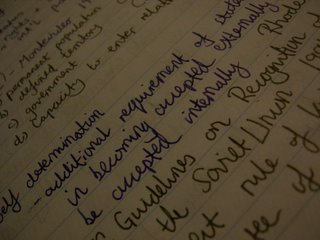
I dozed off in front of the TV. I've not done that in a long time, but I was this tired today.
Got up at a little over seven, got dressed, had breakfast and got on my bike. Again, another early start to the day, and I almost forgot how busy it can be on the roads together with all these other (slower) cyclists. Rush, rush, rush... 5km to the station, and less than 15minutes to get there before the train leaves. On time, on board, forehead damp with sweat.
It turned out I was early when I walked in the classroom at 9am sharp. I guess I wasn't paying attention when they said that students here have a so-called 'Leidse kwartier' (Leiden quarter), ie. the first quarter of an hour of each hour people can trickle in and still be considered on time.
Class was fun, and my lecturer (also coordinator) of the course is a very good speaker, thankfully, and not one of those whose voice can bore you to sleep. He's young, French Belgian, with a peculiar way of pronouncing words and seems to have a peculiar way with words that even native English speakers would find amusing. Not so much the grammatical mistakes, but more the way he pronounces words and the his insistence on using strange sentence constructions and 'big' words like "I surmise...", "triffling details", "riddled with pregnancies", "time is gliding fast". But on the whole he's friendly, approachable, knows his stuff but is in no way pompous, and makes the teaching/learning environment actually fun and relaxed. That's good, because we'll be seeing a lot of him. Just today we had four hours of lecture and seminars with him. And that was just day one.
Well, turns out all that reading and preparation I did was a little too much. I thought we were actually going to be discussing the articles and debating, but even in the seminars the lecturer was asking such general questions that you could answer even without doing the 200+pages of reading for the week. Or at least that was the case today. Obviously a lot of people just hadn't read a thing. I knew the answers to many of the questions, but after a couple of times of answering I thought it might be better to 'hold myself back'... frankly it's just not 'cool' to be a know-it-all, especially on the first day. To top off the 'heavy' day we had today, we received our first assignment, due in less than three weeks, already!
We had a small coffee break and I went to stand in the que for hot chocolate (my favourite!) There was a good-looking guy in front of me, and he was waiting for his coffee to be dispensed. He turned to look at me, and gave me a really big smile. I smiled back and felt a little embarrased, mostly by the very direct and intense way he was looking at me. It was like he wanted to say something to me, but not sure how. Class started soon enough, but throughout the lecture, while listening as attentively as I could to the lecturer, I unexpectedly found myself stealing silent shy glances in the guy's direction, just a metre or so away. Was he...? Could he be...? Why would he want to...?
After class the same guy came up to me as I was talking to some other people, smiling that big smile again. I bit my lip on the inside and swallowed my shy self, and reached out, introducing myself. We chatted briefly, and there were some other people around us, but he seemed to be looking at me...a lot. Then out of nowhere he suggested that perhaps we should meet sometime to discuss the assignment together. I agreed. We just covered the 'presumption principle' in our readings--the idea which roughly says that unless something is expressly said to be A, nothing bars it being intepreted as B-- I presumed that 'working together' is what he wanted...
We had a two hour break before the seminar in the afternoon. I went to lunch with the cute Finnish guy, and we had quite a good time together, chatting and getting to know each other better. We decided to go study a bit in the park, but the weather was so nice and we couldn't keep on reading without our concentration being interrupted every few minutes by mocking the language of international law or little laughs about this or another sillyness. At one point he was laughing so much he actually cried... A strange sight, to see him cry, and strange feelings went through my mind. His eyes, radiant with such a beautiful tone of greyish green-blue lustre, went moist. Tears clung onto the soft skin just beneath his lashes. I wanted to lift my finger and brush away the moisture... *shudder*
A bunch of us 'celebrated' our first class together by going to a cafe and drinking in the late Summer's sun. We agreed to go on an outing tomorrow to Amsterdam, since some of the people in class are completely new in the country. Just as we were discussing what we could do and see, my friend nonchalantly said: "Oh, there are plenty of museums, Van Gogh, Anne Frank House, and then there's the Homo-monument."
[Homo-monument is the world's first monument dedicated to homosexuals persecuted during WWII, a general tribute to the homo-lesbian-bisexual struggle]
A surprise really, and I looked at him silently. He had the expression on his face as if that was the most normal thing to say. As we walked toward the station together he dropped this little remark, actually lyrics from a love song I can't remember the exact wording or name of. But it was along the lines of: I'll go where you go, and be with you...
I don't know... but don't you have this feeling that when you fancy someone, it seems like everything you see or hear is screened through a filter that adds that infatuation? I did today, and it seems everytime I'm with that guy. Like I'd look at the fine hairs on the back of neck, notice an eyelash dangle loosely on his cheek, see the way his fair caresses his forehead and wraps around his ears, peek into the opening of his shirt and see the small hairs on his chest... everything seemed so beautiful, so perfect. And even small comments and remarks would make me 'jump' inside. I try to blink it all away, to shake away those thoughts, knowing fully that if it goes on like this it'll do more harm than good. It's just too much! And it's hard.
Oh well, tomorrow should prove interesting. Sightseeing in Amsterdam can be a little wild and crazy...besides the cliche canals, tulips, wooden shoe souvenir shops, we'll undoubteldy be treading into the Red Light District and the famous Dutch 'coffeeshops'... Shops that don't really sell coffee but another kind of 'mind-stimulating substances'. If you know what I mean...




